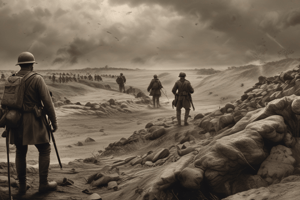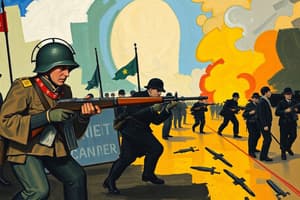Podcast
Questions and Answers
Which European nation had nearly 100 warships and two million trained soldiers by 1914?
Which European nation had nearly 100 warships and two million trained soldiers by 1914?
- Germany (correct)
- France
- Great Britain
- Russia
What was the main goal of the French during the early 20th century?
What was the main goal of the French during the early 20th century?
- To maintain peace in Europe
- To avenge their defeat in the Franco-Prussian war (correct)
- To conquer the Balkans
- To form an alliance with Germany
What was the main cause of tension in the Balkans?
What was the main cause of tension in the Balkans?
- Capitalism
- Imperialism
- Nationalism (correct)
- Militarism
Who was assassinated in Sarajevo, sparking World War I?
Who was assassinated in Sarajevo, sparking World War I?
What was the response of Austria-Hungary to the assassination of Archduke Franz Ferdinand?
What was the response of Austria-Hungary to the assassination of Archduke Franz Ferdinand?
What was the main objective of the Schlieffen Plan?
What was the main objective of the Schlieffen Plan?
Why did Germany follow the Schlieffen Plan?
Why did Germany follow the Schlieffen Plan?
What was the consequence of Austria-Hungary's declaration of war on Serbia?
What was the consequence of Austria-Hungary's declaration of war on Serbia?
What were the two main military blocks during WWI?
What were the two main military blocks during WWI?
What was a major force that helped set the stage for war in Europe?
What was a major force that helped set the stage for war in Europe?
What was the original composition of the Triple Alliance in 1882?
What was the original composition of the Triple Alliance in 1882?
What was the consequence of the creation of several military alliances?
What was the consequence of the creation of several military alliances?
What was the name of the agreement that transformed the Franco-Russian Alliance into the Triple Entente?
What was the name of the agreement that transformed the Franco-Russian Alliance into the Triple Entente?
What was the name of the military alliance that Italy joined in 1915?
What was the name of the military alliance that Italy joined in 1915?
What was the period during which the First World War took place?
What was the period during which the First World War took place?
What was the name of the video link that provides additional information on the causes of WWI?
What was the name of the video link that provides additional information on the causes of WWI?
Study Notes
Causes of World War I
- Mutual Defense Alliances: Led to the creation of military alliances among Great Powers, designed to keep peace in Europe but ultimately pushed the continent into war.
- Triple Alliance: Originally formed in 1882, comprising Germany, Austria-Hungary, and Italy, but Italy left in 1915 and joined the Triple Entente.
- Triple Entente: Developed from the Franco-Russian Alliance of 1894, followed by the British and French Entente Cordiale of 1904, and transformed into a Triple Entente following the Anglo-Russia Agreement of 1907, consisting of over 20 countries, including the USA, Japan, and Rumania.
Other Contributing Factors
- Imperialism: European nations competed fiercely for colonies in Africa and Asia, deepening rivalry and mistrust.
- Militarism: The arms race in Europe, particularly in Germany, Great Britain, and Russia, increased military influence on public policy, pushing countries towards war.
- Nationalism: Tension between France and Germany, as France sought to avenge its defeat in the Franco-Prussian War, and Balkan nationalism aimed to be independent of Ottoman Turkish domination.
Immediate Cause
- Assassination of Archduke Franz Ferdinand: On June 28, 1914, by Serbian nationalist Gavrilo Princip in Sarajevo, Bosnia, which was part of Austria-Hungary.
Course of World War I
- Austria-Hungary's Ultimatum: Sent to Serbia on July 23, 1914, which led to the declaration of war on July 28, 1914.
- German Plan: Followed the Schlieffen Plan, which proposed to attack France through Belgium, occupy Paris within six weeks, and then turn on Russia.
Studying That Suits You
Use AI to generate personalized quizzes and flashcards to suit your learning preferences.
Description
This quiz covers the causes, course, and consequences of the First World War, including the identification of the causes and assessment of the consequences.




